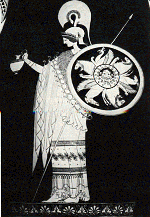 s Athene's father was the most powerful and her mother the wisest among gods Pallas Athene became the symbol of power and wisdom, the preserver of the state, and the patroness of elegant and useful arts.
s Athene's father was the most powerful and her mother the wisest among gods Pallas Athene became the symbol of power and wisdom, the preserver of the state, and the patroness of elegant and useful arts.
Like his father, Zeus feared progeny more powerful than himself. Zeus's first wife was Metis, the personification of prudence.
Metis assisted him in his war with Cronus and the Titans for the establishment of government on the earth, and when she announced she was pregnant, he ate her.
Afraid lest the child of his union with Metis be wiser than he, Zeus swallowed her and subsequently gave birth to Athene, who sprang from his head in full battle armour.

Athene protected the state from enemies and in the Trojan War sided with the Greeks. She suggested to Odysseus the stratagem of the wooden horse, and protected the hero on his long and dangerous odyssey.
With her steely and clear grey eyes she became her father's favourite.
Often depicted with the aegis and golden staff she brandishes Zeus's thunderbolt and a shield or breastplate with the head of Medusa, which never failed to strike fear into the hearts and souls of all opponents in battle.
Athene's childhood was clouded by a tragic accident. While engaging in war-play with a human girl, she accidentally killed her. In tribute, she took the girl's name, Pallas, as her own first name.
As a battle goddess, Athene was a tireless defender of home and state from enemies and was inevitably accompanied by Nike, the spirit of victory.
Athene is something of a prude, who looked askance on any attempts on her chastity. Tiresias, a renowned seer of antiquity, was deprived of his sight for having spied on her bath, and Hephaestus, who attempted to seduce her was made to flee.
Usually mild-mannered, she lost her temper when a Lydian maiden, Arachne, daughter of Idmon, a famous dyer in purple, who excelled in the art of weaving, challenged her to a contest.
The god and the mortal would each weave a cloth which would show the lives and loves of the gods. The maiden produced a cloth which showed no faults and thus won the contest. Athene, enraged, tore the work to pieces and in despair Arachne obtained a rope to hang herself.
When Athene came upon her, she turned the rope into a cobweb and Arachne herself into a spider. This fable seems to suggest that the gods themselves were not perfect, that man learned the art of weaving from the spider and that the first commercial weaving was in Lydia.
